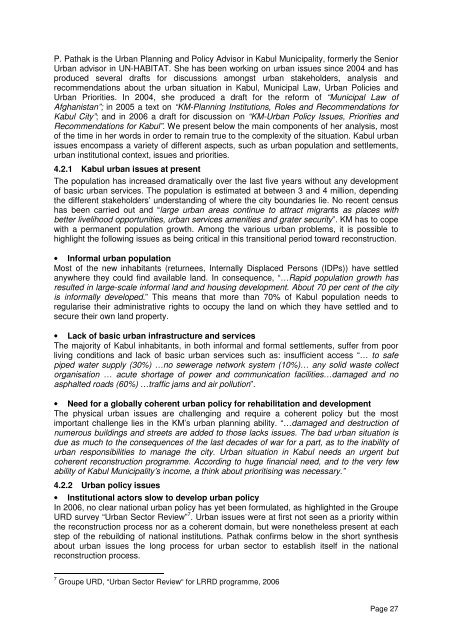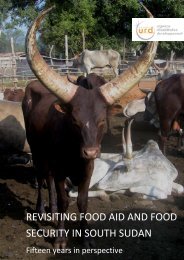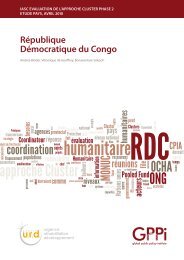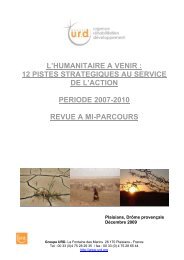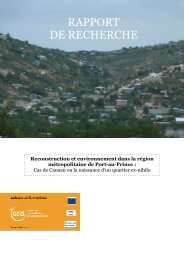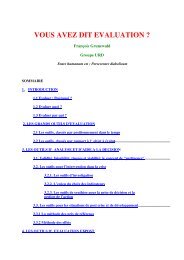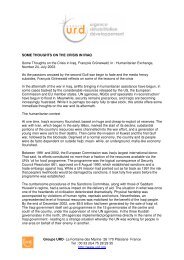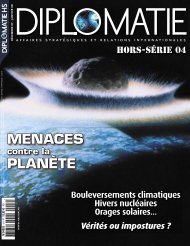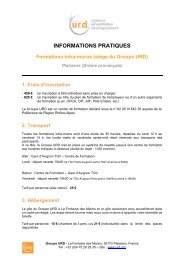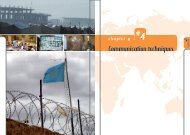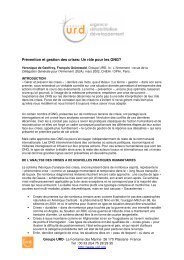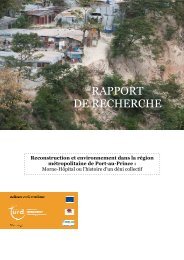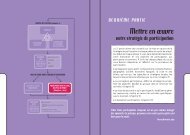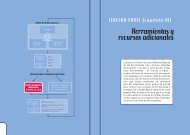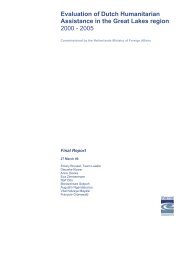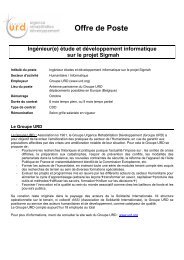Kabul Urban Survey - Groupe URD
Kabul Urban Survey - Groupe URD
Kabul Urban Survey - Groupe URD
Create successful ePaper yourself
Turn your PDF publications into a flip-book with our unique Google optimized e-Paper software.
P. Pathak is the <strong>Urban</strong> Planning and Policy Advisor in <strong>Kabul</strong> Municipality, formerly the Senior<br />
<strong>Urban</strong> advisor in UN-HABITAT. She has been working on urban issues since 2004 and has<br />
produced several drafts for discussions amongst urban stakeholders, analysis and<br />
recommendations about the urban situation in <strong>Kabul</strong>, Municipal Law, <strong>Urban</strong> Policies and<br />
<strong>Urban</strong> Priorities. In 2004, she produced a draft for the reform of “Municipal Law of<br />
Afghanistan”; in 2005 a text on “KM-Planning Institutions, Roles and Recommendations for<br />
<strong>Kabul</strong> City”; and in 2006 a draft for discussion on “KM-<strong>Urban</strong> Policy Issues, Priorities and<br />
Recommendations for <strong>Kabul</strong>”. We present below the main components of her analysis, most<br />
of the time in her words in order to remain true to the complexity of the situation. <strong>Kabul</strong> urban<br />
issues encompass a variety of different aspects, such as urban population and settlements,<br />
urban institutional context, issues and priorities.<br />
4.2.1 <strong>Kabul</strong> urban issues at present<br />
The population has increased dramatically over the last five years without any development<br />
of basic urban services. The population is estimated at between 3 and 4 million, depending<br />
the different stakeholders’ understanding of where the city boundaries lie. No recent census<br />
has been carried out and “large urban areas continue to attract migrants as places with<br />
better livelihood opportunities, urban services amenities and grater security”. KM has to cope<br />
with a permanent population growth. Among the various urban problems, it is possible to<br />
highlight the following issues as being critical in this transitional period toward reconstruction.<br />
• Informal urban population<br />
Most of the new inhabitants (returnees, Internally Displaced Persons (IDPs)) have settled<br />
anywhere they could find available land. In consequence, “…Rapid population growth has<br />
resulted in large-scale informal land and housing development. About 70 per cent of the city<br />
is informally developed.” This means that more than 70% of <strong>Kabul</strong> population needs to<br />
regularise their administrative rights to occupy the land on which they have settled and to<br />
secure their own land property.<br />
• Lack of basic urban infrastructure and services<br />
The majority of <strong>Kabul</strong> inhabitants, in both informal and formal settlements, suffer from poor<br />
living conditions and lack of basic urban services such as: insufficient access “… to safe<br />
piped water supply (30%) …no sewerage network system (10%)… any solid waste collect<br />
organisation … acute shortage of power and communication facilities…damaged and no<br />
asphalted roads (60%) …traffic jams and air pollution”.<br />
• Need for a globally coherent urban policy for rehabilitation and development<br />
The physical urban issues are challenging and require a coherent policy but the most<br />
important challenge lies in the KM’s urban planning ability. “…damaged and destruction of<br />
numerous buildings and streets are added to those lacks issues. The bad urban situation is<br />
due as much to the consequences of the last decades of war for a part, as to the inability of<br />
urban responsibilities to manage the city. <strong>Urban</strong> situation in <strong>Kabul</strong> needs an urgent but<br />
coherent reconstruction programme. According to huge financial need, and to the very few<br />
ability of <strong>Kabul</strong> Municipality’s income, a think about prioritising was necessary.”<br />
4.2.2 <strong>Urban</strong> policy issues<br />
• Institutional actors slow to develop urban policy<br />
In 2006, no clear national urban policy has yet been formulated, as highlighted in the <strong>Groupe</strong><br />
<strong>URD</strong> survey “<strong>Urban</strong> Sector Review” 7 . <strong>Urban</strong> issues were at first not seen as a priority within<br />
the reconstruction process nor as a coherent domain, but were nonetheless present at each<br />
step of the rebuilding of national institutions. Pathak confirms below in the short synthesis<br />
about urban issues the long process for urban sector to establish itself in the national<br />
reconstruction process.<br />
7 <strong>Groupe</strong> <strong>URD</strong>, “<strong>Urban</strong> Sector Review“ for LRRD programme, 2006<br />
Page 27


